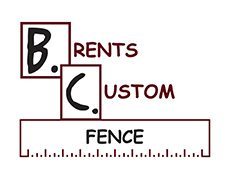Understanding What Goes Into Your Fence Investment
The cost to install 6ft chain link fence can vary significantly, as the final price depends on several key factors. Understanding these variables is crucial before you start digging post holes or calling contractors. Key considerations include:
- Material quality – Galvanized steel vs. vinyl-coated options
- Labor costs – DIY installation vs. professional service
- Site conditions – Level ground vs. sloped terrain
- Additional features – Gates, privacy slats, or decorative elements
- Local requirements – Permits, surveys, and HOA approvals
Chain link fencing stands out as one of the most affordable and durable options for homeowners seeking security without breaking the bank. Whether you’re creating a safe play area for kids and pets or simply defining your property boundaries, a 6-foot fence offers excellent value.
However, the difference between galvanized and vinyl-coated mesh alone can swing your budget. Add in factors like gates, privacy slats, or challenging terrain, and a straightforward project can become more complex. This guide breaks down every factor that influences your installation costs, from the wire gauge you choose to whether you tackle the job yourself or hire a professional. We’ll help you make informed decisions that balance your budget with your security needs.
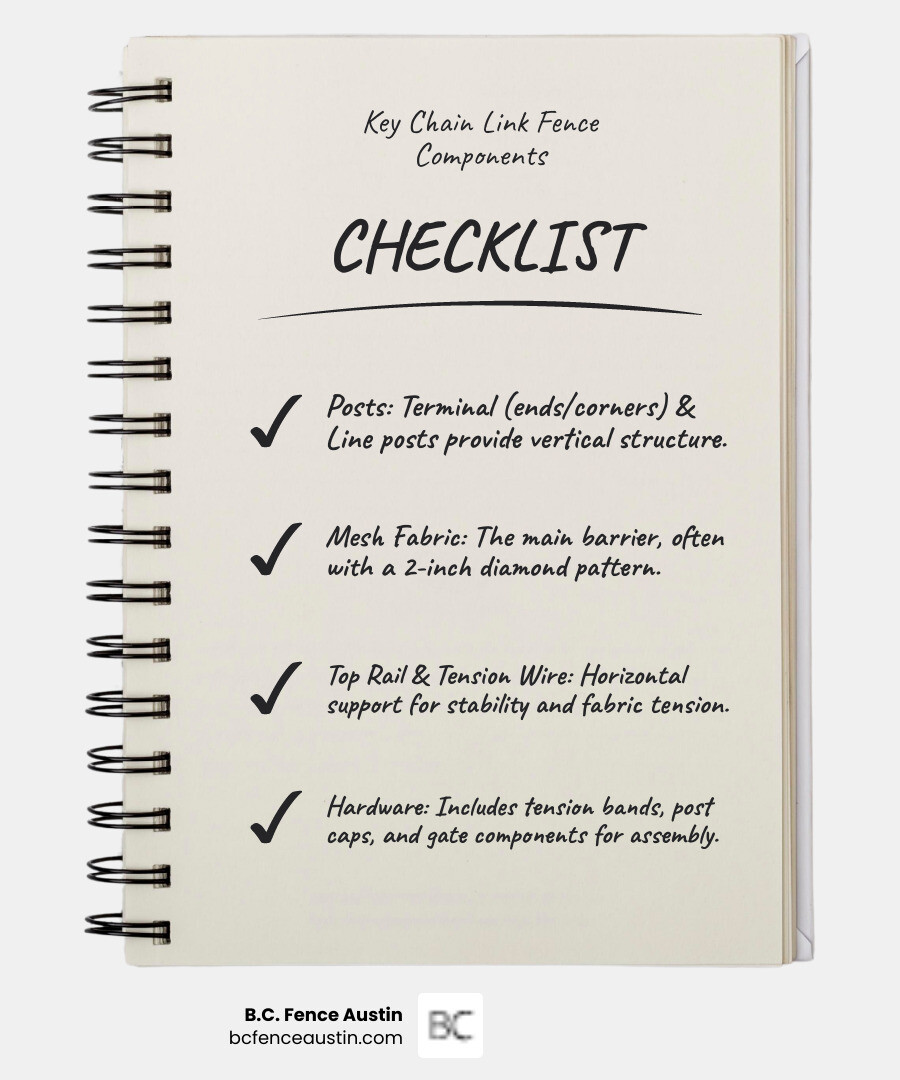
Key Factors That Determine the Cost to Install a 6ft Chain Link Fence
When planning your fence project, understanding what drives the cost to install 6ft chain link fence helps you budget wisely. The most obvious factor is the length of the fence, measured in linear feet. However, several other elements play a significant role.
The quality of materials, such as galvanized steel versus vinyl-coated mesh, directly impacts your initial investment and the fence’s longevity. Labor rates in Austin also vary based on project complexity. A straightforward installation on flat, clear ground will differ in cost from a project involving slopes, rocky soil, or old fence removal. For a deeper look at these components, our guide on chain link fence details offers a solid foundation.
Material Selection: Gauges, Coatings, and Your Budget
The materials you choose for your chain link fence aren’t just about aesthetics—they’re about how well your fence performs over the years and how much you’ll invest today.
Galvanized steel is the classic, reliable choice. Its zinc coating protects the steel from rust and corrosion, offering a durable fence that stands up to Austin’s weather.
Vinyl-coated mesh is an upgrade, featuring a layer of vinyl over galvanized steel for improved rust resistance and a smoother appearance. It’s available in colors like black and green that blend beautifully with landscaping. A black vinyl-coated fence tends to disappear into the background more than silver galvanized steel. Our Chain Link Fence Color Options Guide walks you through the possibilities.
Two other specifications impact performance:
Wire gauge thickness measures how thick the metal strands are—lower numbers mean thicker wire. A 9-gauge wire is much stronger than an 11.5-gauge wire. Thicker wire means better security and durability. Most residential fences use 9 to 12-gauge wire.
The mesh diamond size refers to the openings in the fabric. Standard residential mesh has 2-inch diamonds, but smaller 1-inch mesh is available for better security or containing small animals. Smaller mesh requires more material, affecting the cost.
Higher-quality materials with better coatings and thicker gauges mean a larger upfront investment, but they also deliver a fence that requires less maintenance and lasts considerably longer.
Labor and Complexity: The Pro vs. DIY Cost to Install a 6ft Chain Link Fence
Labor is where the cost to install 6ft chain link fence can swing dramatically. You must honestly assess whether to DIY or hire professionals.
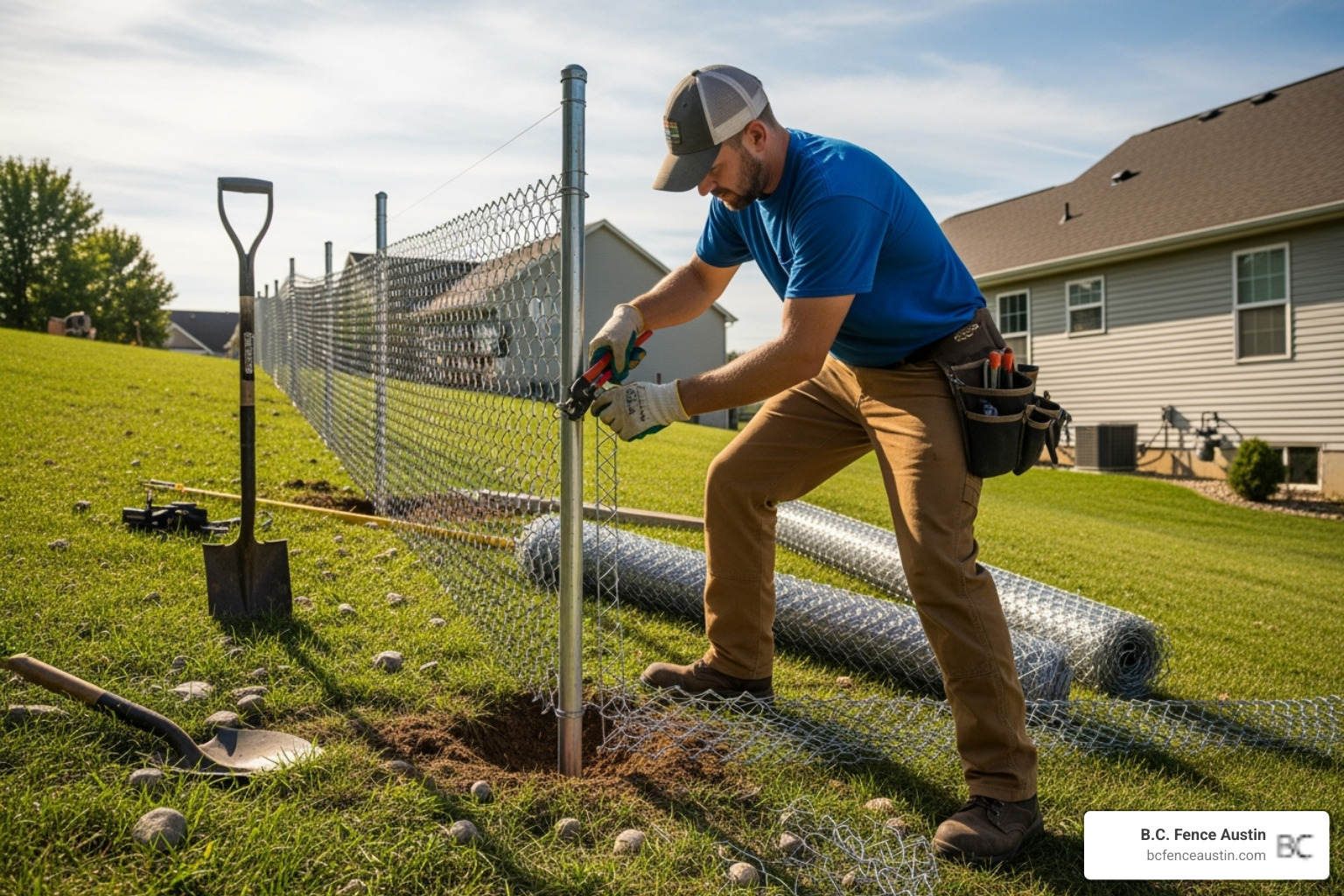
Professional installers bring valuable experience, specialized tools, and knowledge of local building codes. They handle unexpected challenges and deliver a secure, visually appealing finished product.
Several factors increase labor complexity. Site preparation may involve clearing vegetation, removing an old fence, or grading uneven areas. The terrain itself is a huge factor. A sloped yard, rocky soil, or obstacles like trees and utility lines require more time and specialized techniques. Digging post holes in rocky Austin soil is far more demanding than in soft earth.
Professionals have all the necessary equipment, like power augers and fence stretchers, which are essential for a taut, professional finish. A DIY approach requires buying or renting these tools.
While DIY installation can save on labor costs, it demands significant time, effort, and skill. Mistakes in post spacing, concrete mixing, or stretching the mesh can compromise the fence’s integrity, leading to leaning posts or sagging fabric. For homeowners who want guaranteed, lasting results, professional installation is often the best investment. If you’re handy and up for a challenge, our Chain Link Fence Installation Tips can guide you.
Beyond the Basics: Additional Features That Impact Your Budget
A chain link fence is a versatile foundation you can customize with features that improve its function for your specific needs. Adding a wide gate for a mower or privacy slats can transform a simple barrier into a custom solution. These customizations affect the cost to install 6ft chain link fence, but they also add significant value.
You can add features over time or include them from the start. Whether for a backyard or a commercial lot, these additions create a fence that’s uniquely suited to you. For larger projects, we have more info about commercial chain link fences that may be helpful.
Gates and Privacy: Customizing the Cost to Install a 6ft Chain Link Fence
Gates are essential for access and come in various styles. A simple walkway gate is perfect for foot traffic. For vehicles, a larger driveway gate, often in a double-gate setup, provides the necessary width and strength. For ultimate convenience, automated rolling gates offer motorized access, ideal for businesses or high-traffic residential properties.
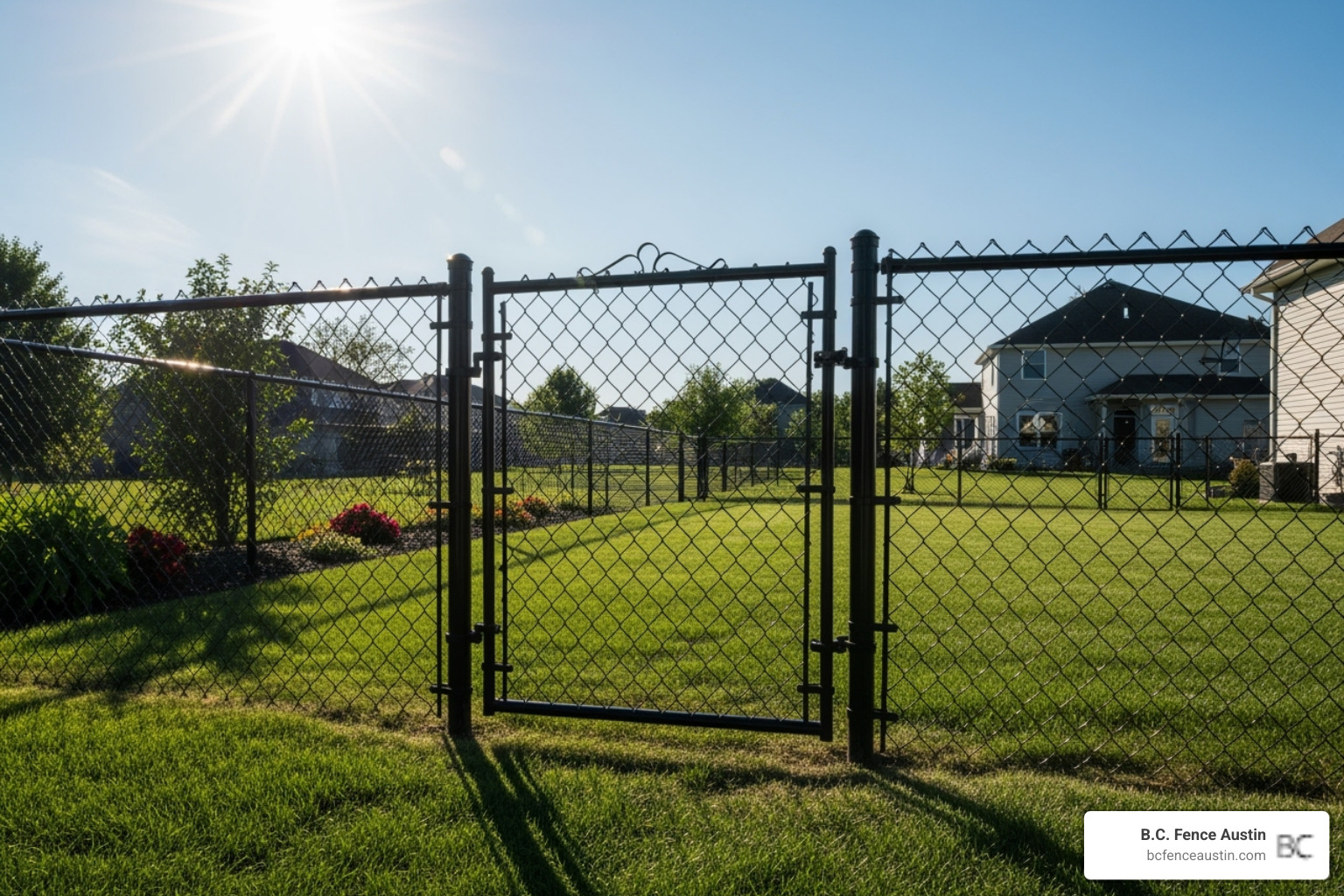
If privacy is a concern, you have affordable options. Privacy slats are vinyl or aluminum strips woven into the mesh to block the view. They come in various colors to match your home and are a cost-effective alternative to a solid privacy fence. Our Chain Link Fence Privacy Slats guide has more details. Decorative fabric screens can also be attached to block views and wind.
Finally, post caps provide a polished look and protect posts from weather damage. Each of these features adds value, whether it’s functionality, privacy, or curb appeal.
Permits, Surveys, and Other Hidden Considerations
This part isn’t as exciting as picking colors, but it’s crucial. Several behind-the-scenes requirements can trip up a project if you’re not prepared.
Building permits are often required for fence installation, especially for a 6-foot fence. Your local municipality has rules to ensure fences meet safety standards and don’t violate height or sightline restrictions. In some cases, such as fencing around pools, permits are non-negotiable for safety reasons. It’s always best to check with your local planning department before starting.
If you live in a neighborhood with a Homeowners Association (HOA), you’ll need their approval. HOAs have specific rules about fence heights, materials, and colors. Getting their approval in writing beforehand can save you from costly disputes or having to remove a newly installed fence.
A property line survey is a smart investment if you’re not 100% certain of your property boundaries. It prevents disputes with neighbors by providing clear, official lines to follow.
Before any digging, you must call 811 to have utility lines marked. In Texas, you can submit a locate request online through Texas811. This free service identifies underground gas, water, and electrical lines. Hitting a utility line is dangerous and can lead to expensive repairs. This step is non-negotiable.
Taking care of these administrative steps may add time and cost to your project, but they prevent nightmare scenarios involving fines, disputes, or damaged utilities. Proper planning ensures your fence project goes smoothly from start to finish.
Comparing Your Options: 6ft Chain Link vs. Other Fences
When considering the cost to install 6ft chain link fence, it’s helpful to see how it compares to other materials. The real value emerges when you factor in maintenance, lifespan, and long-term durability.
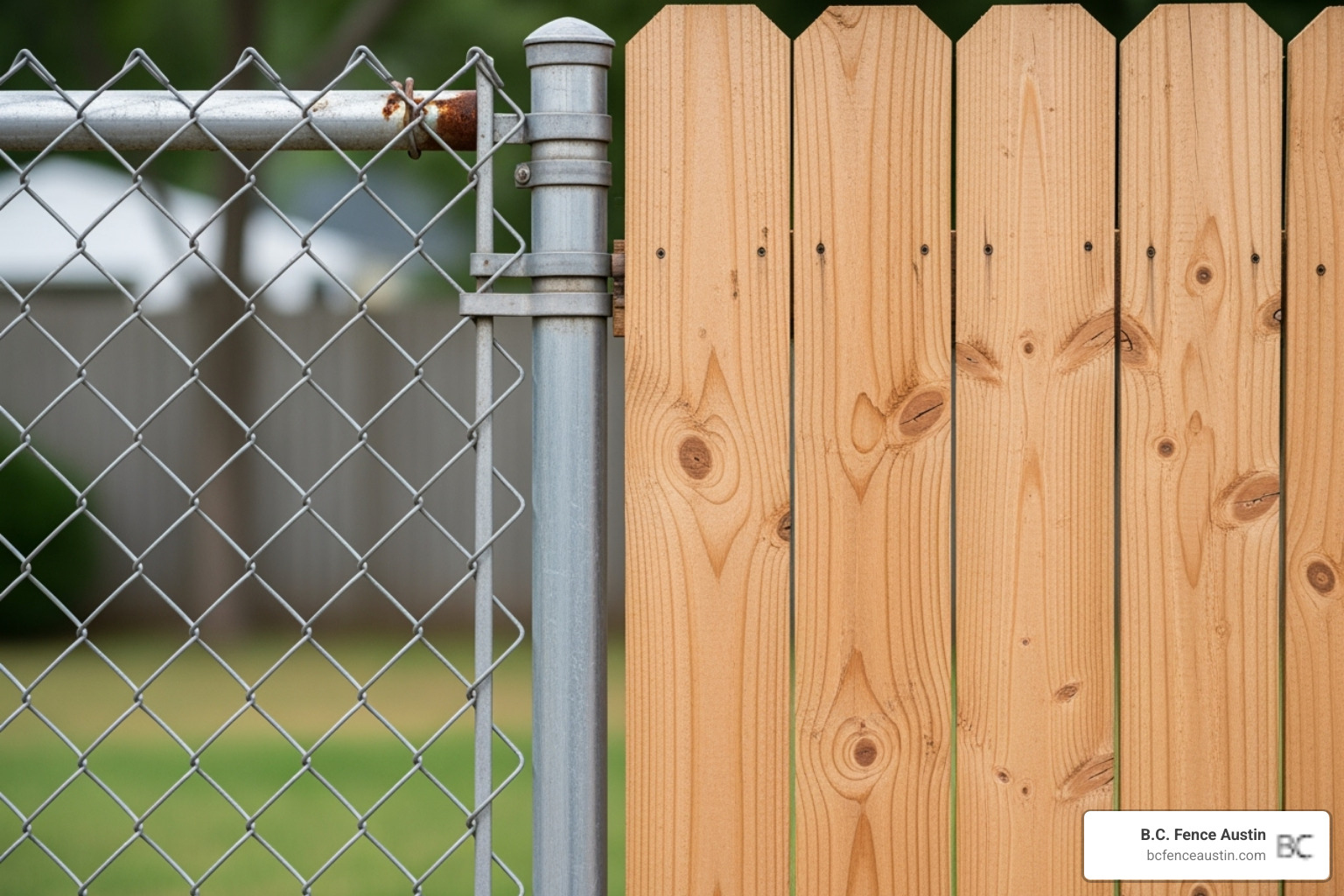
- Wood Fencing: Offers a classic look but requires regular staining or sealing to prevent rot and warping, especially in Austin’s climate. The ongoing maintenance adds to the long-term cost.
- Vinyl Fencing: A low-maintenance privacy option that won’t rot or need painting. However, it requires a significantly higher upfront investment than chain link.
- Aluminum Fencing: Provides an neat, rust-resistant, and low-maintenance option. It’s typically more expensive than chain link and is more decorative than security-focused.
Chain link’s appeal lies in its minimal maintenance. A galvanized or vinyl-coated fence requires virtually no upkeep. Its lifespan is also impressive: galvanized fences last 15-20 years, while vinyl-coated versions can last 20-30 years or more, outperforming wood. The open-weave design also handles strong winds better than solid fences, a key advantage in Austin.
For reliable security and containment without ongoing expense, a 6ft chain link fence delivers exceptional value. It’s a straightforward, durable solution. To explore other options, see our Chain Link Fence Alternatives guide.
Frequently Asked Questions about 6ft Chain Link Fence Installation
We know planning a new fence comes with questions. Here are answers to some of the most common ones we hear about the cost to install 6ft chain link fence and what to expect from your investment.
How long does a 6ft chain link fence last?
A properly installed chain link fence is built for the long haul. A galvanized fence typically lasts 15 to 20 years. If you opt for a vinyl-coated chain link fence, you’re investing in even greater longevity, often 20 to 30 years or more, thanks to the extra protective layer that offers superior rust resistance. Simple maintenance, like checking connections and addressing minor damage promptly, can extend its life even further.
Is a 6ft chain link fence a good choice for security?
Absolutely. A 6ft chain link fence provides a significant height advantage that deters most trespassers. It’s also ideal for creating a safe, secure space for children and pets. For improved security, you can opt for a thicker gauge wire (lower numbers are thicker) and a smaller mesh size (e.g., 1-inch diamonds), which make the fence harder to cut or climb. These features are especially valuable for commercial properties. For more tips, see our Chain Link Fence Security Guide.
How does the terrain of my property affect the installation?
Your property’s terrain significantly impacts installation complexity and the required investment. We are experienced in handling all kinds of challenging sites.
- Sloped yards require “stepping” the fence—installing sections at different heights to follow the land’s contour. This takes more time and materials.
- Rocky soil makes digging post holes much more demanding, often requiring specialized equipment and increasing labor time.
- Trees and obstacles along the fence line complicate installation and require careful planning to work around.
- Uneven terrain may require grading to create a stable foundation for the fence before installation can begin.
A professional on-site assessment is the best way to evaluate these challenges. We can provide a comprehensive estimate that accounts for your property’s unique topography, ensuring a stable, long-lasting, and attractive fence with no surprises.
Get a Professional Finish for Your Fencing Project
We’ve covered how the cost to install 6ft chain link fence varies with materials, labor, terrain, and custom features. While a DIY project can be rewarding, professional installation ensures a fence that holds strong for decades, rather than one that sags or leans after a few seasons. Proper post alignment, concrete mixing, and mesh tension are critical details where expertise shines.
At B.C. Fence Austin, we’ve mastered chain link installation on all types of Austin properties, from steep slopes to rocky soil. Our team solves the unique challenges your property presents, ensuring every post is secure and every gate swings smoothly.
Choosing professional installation is an investment in durability, aesthetics, and security. We handle everything from permits to cleanup, making the process seamless. Your property deserves a fence that’s built to last and installed right the first time. Let us bring our expertise to your project.
Get a professional chain link fence installation quote and let’s start building the secure, attractive fence your property deserves.
